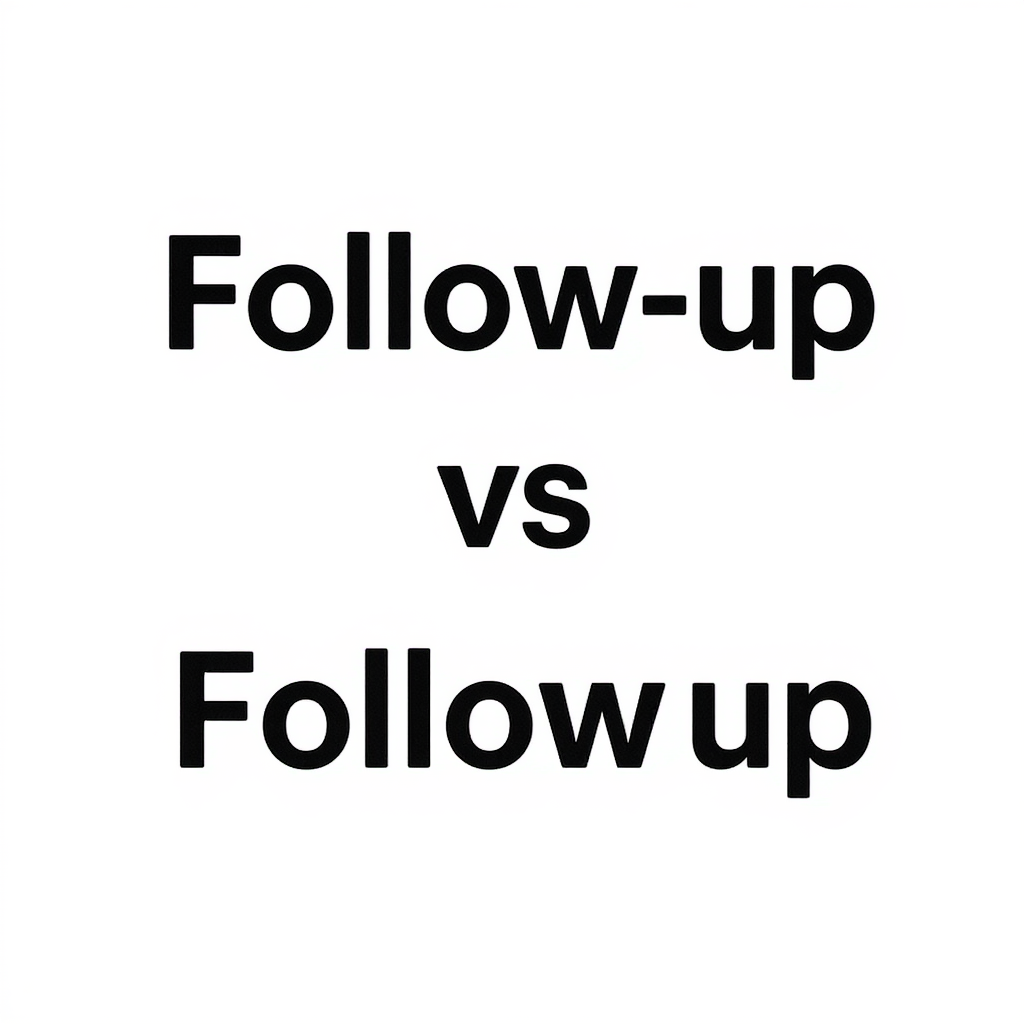"Follow up" Vs "Follow-up" Vs "Followup" - What’s the Difference?

English loves to confuse us with words that look nearly the same but act differently depending on the context. A perfect example is “follow up,” “follow-up,” and “followup.”
They’re connected but not interchangeable. Today, Midoo AI will explain the difference step by step with simple rules, examples, and tricks so you’ll never hesitate again.
Follow up (verb)
Follow up (two words) is a verb phrase. It means “to take action later” or “to check on something again.”
Think of it as the action you do after the first step.
Examples of “Follow up” (verb):
- I’ll follow up with you tomorrow.
- The doctor will follow up after the surgery.
- She forgot to follow up on the email.
- The police will follow up on the report.
- Please follow up with your manager about this issue.
👉 If you’re talking about doing something later or continuing action, use follow up.
Follow-up (noun or adjective)
Follow-up (with a hyphen) works as a noun or an adjective.
- As a noun, it means “the act of following up” or “a secondary action.”
- As an adjective, it describes something related to that next step.
Examples of “Follow-up” (noun):
- The meeting is just a follow-up to last week’s discussion.
- She had a doctor’s follow-up after the treatment.
- The follow-up to the movie was disappointing.
- His follow-up to the first book became a bestseller.
- I need to schedule a follow-up next month.
Examples of “Follow-up” (adjective):
- She asked a follow-up question.
- He scheduled a follow-up appointment.
- The teacher gave a follow-up assignment.
- The manager sent a follow-up email.
- They had a follow-up call after the interview.
👉 If you’re naming the thing (a meeting, call, question, appointment) or describing it, use follow-up.
Followup (one word)
Followup (no hyphen, one word) is less common and often considered informal or nonstandard. Some dictionaries recognize it as a variant spelling of “follow-up,” but in professional or academic writing, follow-up is safer.
Examples of “Followup”:
- He missed his followup appointment.
- The followup report was delayed.
- We need a followup on that issue.
👉 If you’re writing casually, you may see “followup.” But for clarity and correctness, stick with follow-up.
Quick Comparison Table
| Form | Part of Speech | Meaning | Example |
|---|---|---|---|
| Follow up | Verb (action) | To take further action or check again | I’ll follow up with him tomorrow. |
| Follow-up | Noun / Adjective | The next step, or something related to it | She asked a follow-up question. |
| Followup | Noun (informal) | Variant spelling of “follow-up” | He missed his followup appointment. |
Memory Tips
- Two words = action (verb). “I will follow up.”
- Hyphen = thing (noun/adjective). “I have a follow-up meeting.”
- One word = casual variant. Use it only if your audience accepts it, otherwise choose “follow-up.”
Common Mistakes
❌ I will follow-up tomorrow. (wrong — here it’s a verb) ✔️ I will follow up tomorrow.
❌ We had a follow up call. (technically not correct) ✔️ We had a follow-up call.
❌ The doctor scheduled a followup. (informal, less professional) ✔️ The doctor scheduled a follow-up.
FAQs
Is “followup” wrong?
Not completely, but it’s less formal and not preferred in professional writing. Use “follow-up” instead.
Can I say “I will follow-up” as a verb?
No. As a verb, it should always be two words: follow up.
What about American vs. British English?
Both follow the same rule: follow up (verb), follow-up (noun/adjective).
Which is safest in business emails?
Always use follow up for the verb and follow-up for the noun/adjective. Avoid “followup” in formal writing.
How do I know which one to use quickly?
Ask: Is it an action? Then it’s follow up. Is it a thing (noun) or description (adjective)? Then it’s follow-up.
Final Thoughts
The difference is all about grammar roles:
- Follow up = the action (verb).
- Follow-up = the thing or description (noun/adjective).
- Followup = a casual spelling you should avoid in formal contexts.
Midoo AI suggests this simple trick: If you can add “will” before it, it’s “follow up.” If you can add “a” before it, it’s “follow-up.”